|
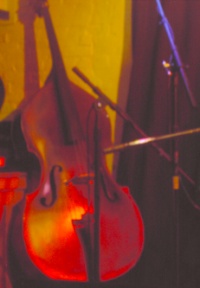
The Boston area
has one of the most active music scenes in the country. For many, the
heart of that scene is Cambridge, home to numerous live music clubs, and
the birthplace of the original House of Blues (may it rest in peace – for
now). For over 45 years, the Passim Folk Music and Cultural Center has
provided the beat to Cambridge’s heart. It has hosted performances by
everyone from Bob Dylan and Joan Baez to Shawn Colvin, from Peter Wolf to
Muddy Waters, and has been the home of folk and acoustic music in Boston
since Suzanne Vega (also once a performer at Passim) was just a twinkle in
her father’s eye.
The venue has experienced some inevitable modifications over the years,
and even a few name changes. Originally opened as a jazz club in 1958, it
was first called Club 47, and then renamed Passim, eventually evolving
into Club Passim. And recently, the nonprofit music club was re-baptized
as the Passim Folk Music and Cultural Center. According to James O’Brien,
the center’s official PR guy and a local folk-rocker himself, the most
recent decision to change the name was “an effort to make the organization
more presentable to the community of philanthropists and sponsors we so
desperately need to maintain our programs.” Historically, the term “club”
has proven to be a hindrance when approaching donors. “Deep pockets” tend
to prefer supporting “centers,” “programs,” or “projects.” Additionally,
simply using “club” to define the organization doesn’t do it justice. The
new name encompasses all of the various elements of the institution’s
mission and is an attempt to clarify that mission for potential
supporters.
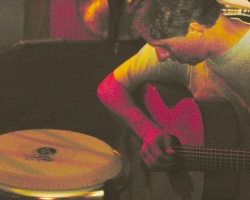
As a nonprofit, Passim must depend on outside funding to supplement the
operating costs attached to its programs. This funding, over and above
admission prices, comes from membership dues, fundraisers (one recently
held at Harvard’s Sanders Theatre raised $34,000 for the Center), and
corporate and foundation grants. For all that Passim accomplishes, they do
so with a relatively small budget (less than $1 million) and an even
smaller full-time staff. But this does not mean they have modest
aspirations; within fifteen years the Center would like to be as
culturally significant in the Boston area as the MFA or the BSO.
To look at the performance space in daylight, you might think it
unimpressive, nothing special. You’d be wrong. As the saying goes, “if
walls could talk,” those bricks would be chattering up a storm. Plenty of
stories could be told about this room and those who spend – and have spent
– time in it. For instance, after only a few short months of operation,
Cambridge police closed the establishment for a violation of blue laws,
which prohibited more than three stringed instruments in a space where
food and drink were being served (local police would have a field day with
that law today!). After reopening as a “private club,” police again shut
the venue down, but performers, who understood the importance of the
music-centered community the club had built, joined forces to keep the
music flowing.
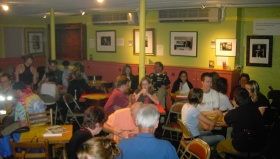 Stephen
Kellogg, a western Massachusetts-based artist, relays a more recent
experience that typifies Passim for him: “I had one really fun night where
the club opened its doors at one a.m. on a Thursday and let us come film
an after-hours show/party which we then released as an enhanced portion on
one of our records. The club we were playing at across town wanted to
charge us more than they were paying us, and we called Matt [Smith,
Passim’s club manager] and he said, ‘That sounds like a blast; let's do
it.’ We were filming until three a.m. and I think most of us who were
there had a very memorable time. I'm thankful for what they've done and
are doing to support me. I know many peers feel the same way.” Stephen
Kellogg, a western Massachusetts-based artist, relays a more recent
experience that typifies Passim for him: “I had one really fun night where
the club opened its doors at one a.m. on a Thursday and let us come film
an after-hours show/party which we then released as an enhanced portion on
one of our records. The club we were playing at across town wanted to
charge us more than they were paying us, and we called Matt [Smith,
Passim’s club manager] and he said, ‘That sounds like a blast; let's do
it.’ We were filming until three a.m. and I think most of us who were
there had a very memorable time. I'm thankful for what they've done and
are doing to support me. I know many peers feel the same way.”
Despite its plainclothes appearance, sound quality in the club is always
impeccable, which is one reason that artists enjoy playing there and
insist on returning, even when their fan base has grown large enough to
fill venues ten times the capacity of Passim. Ryan Montbleau, a Somerville
singer-songwriter who has graced the stage on several occasions, feels
that “it is truly a listening room. People go there to listen. That may
not sound like much, but these days it's no small thing. I can't tell you
how refreshing (and in it's own way, even a bit scary) it is to have a
room full of people locked into your every word.” Audience members attend
shows to hear the music, not to drink beer (which you’d have to go across
the street to find, anyway – Passim is a non-alcoholic establishment. The
attached Veggie Planet does serve a mighty fine elderberry iced tea,
however), not to gossip with their cohorts, and usually not to gawk at the
“rock stars.” Passim show-goers are generally sophisticated, intelligent,
and appreciative listeners.
The crowd at a Passim show these days is fully music-appreciative, but
always unpretentious. You’ll more likely find a friendly face, eager to
share in a stimulating evening, than a holier-than-thou-band attitude.
Many regulars know each other by sight, if not by name, and because of the
cramped quarters, strangers sharing tables unwittingly become friends, if
only for one evening. Staff members work to ensure that the “peace, love,
and understanding” feelings from the era of American folk’s heyday
continue to exist within the confines of the venue. A recent patron
exclaimed, “This is such a friendly place – the friendliest in Cambridge!”
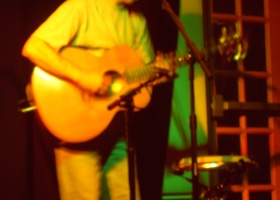
Passim is not Boston’s best-kept secret. In fact, it’s no secret at all.
About 125 people per weekend (and very often, weekday) night file in
through the basement-level door on Palmer Street to catch a national act
or a little-known talent. At the end of a two-show night, nearly 250
people will have overlooked the uncomfortable chairs and occasionally
erratic temperature and taken in the sounds of the evening. During a
recent sell-out for Atlanta-bred, New England-based Brian Webb, more than
a dozen diehards watched the entire show through the big street-level
windows, wearing garbage bags to shield themselves from that night’s
rainstorm.
When asked what makes an amazing Passim show different from a good one,
O’Brien responded, “The moment when the rules change and the performer and
audience create an uncommon moment. It might be an artist playing in the
middle of the room, off mic with the room participating. It might be a
parade of audience and artist through the streets of Cambridge to finish
the concert at the site of the old Club 47. It might be a simple, honest
perfect solo performance any night of the week.”
As cozy, charming, and unique as the brick-walled basement space is, it
does present its challenges. Many aspects of the facility constantly test
management: the undersized green room also serves as club’s night office;
the two co-ed restrooms are shared by all patrons of the venue as well as
the attached restaurant; and the room’s wooden and folding chairs are not
intended for two hours of sitting still (church pews never looked so
appealing). O’Brien states that the “Passim Center is actively searching
for a more modern (but not sterile, certainly) space into which we will
build a fabulous new venue.”
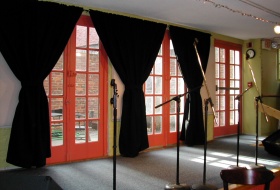 Despite
these challenges and its modest size, artists clamor to have their names
appear on the Passim calendar. Veteran singer/songwriters such as Janis
Ian and Arlo Guthrie often still make appearances, and Mainer Ellis Paul
has been performing a New Year’s Eve show for the past nine years. Since
the beginning of 2004, such nationally recognized names as Tom Paxton,
Michelle Shocked, Chris Smithers, and Steve Forbert have turned up on
Passim’s schedule. Despite
these challenges and its modest size, artists clamor to have their names
appear on the Passim calendar. Veteran singer/songwriters such as Janis
Ian and Arlo Guthrie often still make appearances, and Mainer Ellis Paul
has been performing a New Year’s Eve show for the past nine years. Since
the beginning of 2004, such nationally recognized names as Tom Paxton,
Michelle Shocked, Chris Smithers, and Steve Forbert have turned up on
Passim’s schedule.
Artists repeatedly emphasize the respect and support that the club offers
– often an unusual surprise for them, and no doubt one of the reasons for
their continuing loyalty. Deb Talan, of California-based The Weepies,
says, “Passim is like home base. I measure all clubs and shows in relation
to it, really, and I look forward to times when I get to return there.
Warm, attentive audiences who are ready to be engaged and create a
relationship in an hour-and-a-half. Sound, fair financial deals that weigh
in for the artists and the club. Returning to perform at Passim every few
months is like checking in with a good friend. Everyone who plays there
feels respected, special, and valued as a musician/songwriter and
performer even though there is such a large volume of talent and
creativity that flows through that place.”
Although it may seem that aside from the name, little has changed in the
club over the years, this is not your father’s folk music. These days,
bands regularly feature electric guitar and full drum kits; as evidenced
by recent shows, the club uses a broad definition of “folk” music, and the
singer/songwriters one finds up on stage are not necessarily of the
guy-(or girl)-with-acoustic-guitar variety. Local buzz-band, Averi, which
has opened for both the Goo Goo Dolls and Matchbox Twenty, featured all of
the above during their June show, as well as sound levels that most
certainly shook Harvard’s hallowed halls. And this winter’s “Punks Are
Folks, Too” showcase evening dared to cross the line separating the
genres, proving once and for all that the only difference between the two
is the volume and speed at which the socially conscious, antiestablishment
lyrics are sung.
In addition to the well-known names that file through the club, today’s
Passim continues to be a breeding ground for new musicians. Newbies can
try out their performance skills at the open mic night, held every Tuesday
night. This tradition has been in effect since the first days of the club,
and currently about 30 musicians participate most weeks. Not a bad place
to start if you’re a local singer/songwriter, considering about 5-10%
eventually can be found performing at the club in a more official role,
either as part of a showcase, an opener, or a headliner. Normally more
than 40% of the audience consists of non-musicians who just came to
listen.
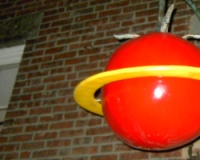
“Where else does a club give people the benefit of the doubt that they are
going to grow and become a better musician and songwriter?” asks Kellogg.
“Nowhere that I can think of, and when you're encouraged in that way it
really makes you believe. I think for some of us songwriter-types, that's
all we need, a little encouragement.” Kellogg finds that encouragement at
Passim.
Lest the daily grind of putting on respected music shows become too simple
and mundane, Passim throws a four-day party twice a year. Begun in 1998,
the Cutting Edge of the Campfire festivals, held every Memorial Day and
Labor Day weekend, comprise four full days of music with over 100 artists
taking to the stage, beginning at noon and ending after midnight. These
events were started as a means to hold shows during two infamously
difficult weekends – an alternative, if you will, for city-dwellers prone
to sitting in Cape traffic – and are a preview of up-and-comers in the
scene, an opportunity to see the faces that will likely grace the venue
during the forthcoming year. The last event of each weekend? A “Closing
Hoot” at 12:30 on Monday night.
If you’ve begun to believe that Passim is solely a live music venue, take
a peek at their mission statement and calendar. In addition to the
performance space, the organization operates a school of music, which
often includes well-known local folkies as instructors, and on top of the
standard guitar and voice classes, offers such diverse options as street
busking and flamenco. The Culture for Kids project is a multicultural
program for elementary and middle school students to help ensure they
receive essential education, in this, the era of funding cuts. Programs
fuse music, history, cooking, performance, and visual arts, and focus on
exposing children who might be lacking in opportunities to unfamiliar
cultures.
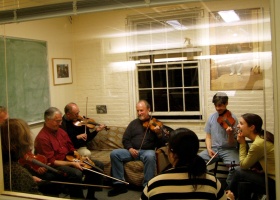 Also
in 1998, the organization undertook the ongoing Archive Project to
document New England’s folk scene throughout the years and to use this
history to provide a context for the present scene. Included in the
collection is a wealth of photographs from throughout the decades (many of
which are currently being displayed on the walls of the club. Check out
the on-stage profile shot of Crosby, Stills, Nash, and Young), as well as
a nearly-complete set of audio recordings from the last ten years or so.
Some of the more unique inclusions are typewritten poems by Bob Dylan and
a reel-to-reel recording of a hootenanny from the 1960s. Also
in 1998, the organization undertook the ongoing Archive Project to
document New England’s folk scene throughout the years and to use this
history to provide a context for the present scene. Included in the
collection is a wealth of photographs from throughout the decades (many of
which are currently being displayed on the walls of the club. Check out
the on-stage profile shot of Crosby, Stills, Nash, and Young), as well as
a nearly-complete set of audio recordings from the last ten years or so.
Some of the more unique inclusions are typewritten poems by Bob Dylan and
a reel-to-reel recording of a hootenanny from the 1960s.
In part, it is this variety and breadth of mission that prompted the
recent name change. The organization is not just a club, a stage, or a
venue. It is a community of people who care about quality music and want
to ensure that it is shared with others to the greatest extent possible,
whether on stage, as a part of music and cultural education, or as a
history lesson.
Any way you cut it, Passim is a community of music. This feeling that can
be sensed as soon as you step through the club’s glass doors hearkens back
to the atmosphere during the original days of the venue, the Club 47 days,
when the students, folkies, and hippies who gathered at Passim provided
its identity and focus. This has been consciously re-cultivated, most
particularly by Tim Mason, Boston music legend and booking manager for
Passim. And it is this community spirit that can be credited for the
club’s long history. Artists and patrons alike have been emotionally
involved with the organization since its early days. Without this
attachment, Passim would either be just another generic music club, or
more likely, would have expired many years ago.
Steve Tannen, second half of The Weepies, observes, “Club Passim is the
hub of a community: a positive group of people who feel that music
matters, and that bringing people together matters too. I think everyone
will agree that Club Passim is a great venue. It's like one of those old
‘respectable establishments.’ First, the club treats everyone with
respect: the audience, the performers, and the community at large. It
makes for a pervading sense, when you walk in there, that you are welcome.
“Second, it's a real establishment – it’s grounded in a place, and in
people who care about it and support it. Through the Passim community, you
feel that there is a continuous history and tradition of folks getting
together, and that you're a part of that. I think that's been the most
gratifying aspect about being involved with Club Passim. It's a folk music
club in the truest sense of those words – where folks get together, drawn
by music, and form a club. And anyone can join, which is another great
thing about it.”
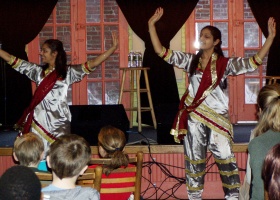
But what exactly does “passim” mean, you ask? It is a word used to
indicate a recurring term or idea in a written work. One-time proprietors
Bob and Rae-Ann Donlin chose the term to describe that indefinable spirit
which is at the heart of all art, and more specifically folk music, and
which they would cultivate throughout all elements of the organization.
O’Brien says name changes notwithstanding, the word will remain forever
because “it’s now associated with high level folk and singer/songwriter
presentation in the northeast United States.”
But perhaps Montbleau’s succinctness sums it up most accurately: “Passim
is an institution for the Boston music scene, and one hell of a nice
little joint to play music in.”
c. 2004, Jenn Osgood

|